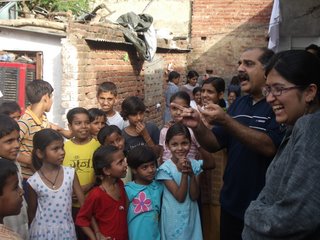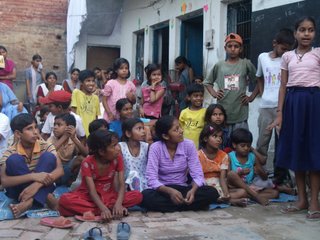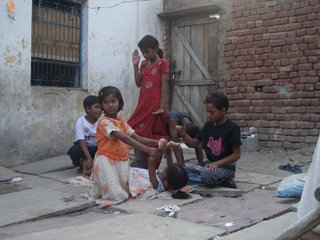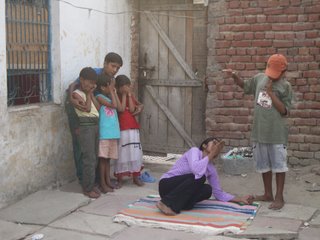



Pandies, a theatre troupe that uses theatre as a medium of social change, recently held a theatre workshop at a slum school called Saksham in Noida. Started in the 1980s, Pandies has
After a few warm-up activities at the school, they arranged children in groups of 5. Each group was to depict a gender-based scenario, and the audience was supposed to guess the scenario being portrayed. Following each performance were debates and discussions on the theme portrayed. The second picture shows the kids in the audience, while in the first you can see Sanjay (founder of Pandies) and Ishaa (a member of the troupe) talking to the kids. In the third picture, the group depicts a girl being sacrificed so that the mother can have a boy-child. In the last picture, the team depicts a drunken man beating up his wife, while the wife's brother looks on and comforts the children.
The discussion sessions after each performance were eye-opening. One team had depicted a cricket match in which 2 boys were playing. In the background, 2 girls were begging to play but were being refused entry by the boys; another girl was cooking for the boys, preparing for their arrival at home. Interesting questions were being tossed around. "Can girls play cricket?" asked Sanjay. One boy confidently stood up to answer. "Girls can play but they shouldn't play, especially near the boys. They should play in separate areas." Another girl, with tears of defiance glimmering in her eyes, stood up to say, "Girls should be allowed to play if they want to!" After another performance, in which a typical Indian dinner-table scene (mother cooking, boys being served) was being depicted, Sanjay asked, "Is it only a mother's duty to cook?" After a few girls and boys nodded in assent, Yogesh stood up and said, "Mother should cook roti-sabzi while the father should be responsible for chai-paani. Everyone should have a role." Upon asking if it was right that the mother should always eat last, a boy stood up and said, "No, no, everybody should eat together. The mother should cook and keep everything ready for the father's arrival so that everyone can eat together."
Interesting stuff, no doubt. Definitely got me thinking about gender and society in a different way.
I intend to write about both groups for the Hindu sometime soon since they both do specacular work, but this will have to do until then!
1 comment:
hi smita,
if you are really working for something related to child labour and some illegal works. im sure i got some thing for you.
Post a Comment